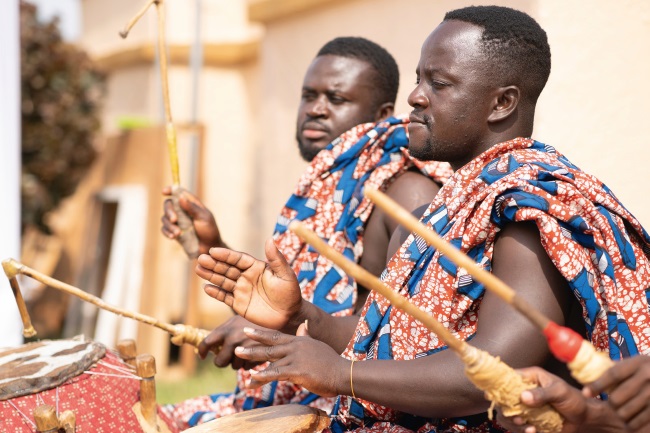Responsible Travel explains how they go softly-softly as they roam the planet.
Cultural holidays in Ghana, Togo and Benin
These three countries are the spiritual heart of West Africa, an intoxicating fusion of tribal culture, voodoo rituals, fire dances – and a dark past represented by the slave forts dotting the coasts. Religion and reality blur, especially in Benin – the home of the voodoo religion where powerful rituals and fearsome fetishes can be seen throughout the country. The vibrant clothing of the Ashanti people in Ghana stands alongside their reputation as incredible coffin carvers – ensuring a flamboyant journey into the afterlife for the deceased. Explore fetish markets and voodoo drumming ceremonies in Togo’s coastal capital, Lome, before continuing on to Benin’s sinister “Door of no Return”, and the impressive, fortified dwellings of the Somba people in the north.
The highlight of this cultural holiday in Ghana, Togo and Benin is joining Ghana’s Adae Festival in Kumasi – an incredible Ashanti celebration.
As the pioneers of responsible tourism, we have screened this (and every) holiday so that you can travel knowing it will help support the places and people that you visit, and the planet. Read how below.

Planet
This tour travels through some remote and often pristine environments, and we make a point of ensuring that we do not leave any permanent traces of our stay behind, making sure that we take all litter with us.
In Boabeng Fiema Monkey Sanctuary we support local conservation efforts through the fees that we pay to enter the reserve. By bringing income to this region it encourages the preservation of wildlife. Local people are able to see the value of the wildlife through the employment that the reserve provides, and are therefore discouraged from hunting.
We include a visit to the fetish market in Lome, which is a traditional market selling animal parts for use in local spells and medicines. Although we realise that this may be controversial, this is a local market for local people, and would exist without the presence of tourism. We strongly discourage our clients from purchasing any of the items on sale. Nevertheless, this provides a unique insight into an intriguing culture.
People
This tour travels through some very remote areas where we are privileged to spend time in the company of local communities. When visiting villages and settlements we make use of local guides from that region, who are able to explain to us the cultures and customs of the people and ensure that we do not unwittingly offend our hosts, many of whom have very complex social beliefs. This is especially important with the Somba people, who are traditionally wary of outsiders and have a very fragile existence. This also helps to provide employment and income for rural communities. We do not believe that we should simply visit these villages without making a financial contribution – it is only fair that they also benefit from the unique experiences that we offer to our travellers.
In our pre-departure information we include guidelines about photography – this is particularly relevant in parts of Togo and Benin where some of the tribal groups are incredibly photogenic. Although many people are happy to be photographed, others are not, and we emphasise to our travellers the importance of respecting people’s wishes. Many people wish to be compensated for having their photograph taken. Although this is a complex issue, we believe that it is only fair to offer this when requested. We do not however promote indiscriminate payment for photographs when it is not requested.
Our philosophy is to only use small and locally owned suppliers, meaning that the income remains within the country and creates a real economic contribution. We also feel that the passion inherent within such suppliers means that your experience will be enhanced. We also try to engage with our suppliers on an equal basis. Getting the lowest possible price usually is not the best outcome for local communities and is ultimately unsustainable. We aim to always treat our suppliers fairly and with respect – they are after all part of the key to our success – and to us, working together is much more than just a business arrangement, it is an ongoing relationship that we aim to ensure truly benefits everyone involved.
We believe that tourism is a double-edged sword that needs to be wielded very carefully. Our philosophy is to have a limited amount of departures – usually between one and three a year – for each of our itineraries. By limiting our presence in areas where local culture can be quite fragile, we hope to avoid as much as possible the phenomenon whereby an area changes in character due to repeated and prolonged exposure to tourism. We want to visit an area as friends, not intruders and to ensure that what we see will also be there for others to enjoy for many years to come.

We only employ local staff and unlike many operators we believe that to send a foreign Tour Leader along to accompany your trip is an unnecessary burden on your wallet and our carbon footprint. This means your money stays in the area to benefit the local community. When possible we use local transport, (i.e. rail or bus) and we always use local restaurants, markets and shops and encourage our clients to interact both financially and socially with the communities that they are passing through. In doing this your travels are supporting and encouraging the development of local services.
We only work with operators who are as committed as we are to putting something back into the communities we visit. This may include giving a percentage of the profits from each tour to a foundation to help street children or local conservation projects. Furthermore, to allow our clients to make an informed decision on where a greater proportion of their money should be spent, we avoid including prepaid full board meals where possible. In this way, local restaurants and cafes will benefit.
Our groups average only six clients, and many tours operate on a private basis with only two travellers. This has much less impact when travelling through rural areas, reducing our environmental and social effects. Finally, to emphasise our commitment to Responsible Tourism, all clients will receive a copy of our Travellers’ Code of Conduct with their travel documents.
For more information: Discover the full itinerary at www.responsibletravel.com







